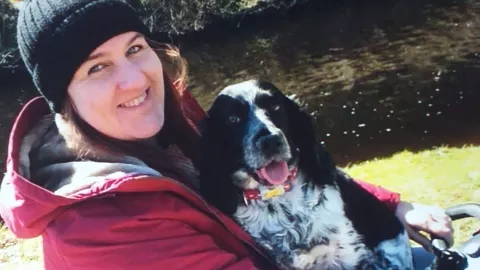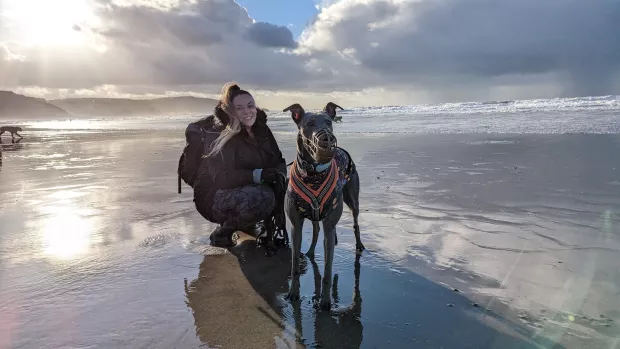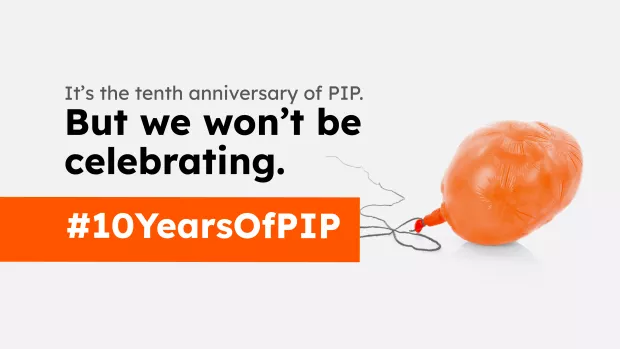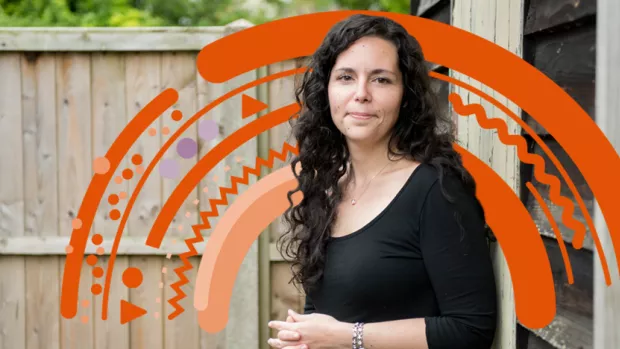
Asking someone to prove they’re ill is cruel
Four weeks from having my first symptom I was diagnosed with MS and I couldn’t work. I had a series of episodes one after the other. I was very active up to this point. I worked full time, I had two young children in primary school, and we would do all sorts of outdoor activities at the weekends.
I was a behavioural scientist, and I couldn’t do that anymore. I found losing that hard.
Initially I had Disability Living Allowance (DLA). Then it changed to Personal Independence Payment (PIP). I found applying for PIP the most demoralising, dehumanising experience.
Filling in the huge form was exhausting. So my carer did it for me. Then I got the dreaded ‘you need to go in for an interview’ letter. I had heard the horror stories.
The PIP assessment
I was in there for three hours. There were loads of questions. I was lucky, my assessor was good, she added in extra details about my mobility. I explained that I use one walking stick on a good day, two on a worse day, crutches if I get worse, then an electric wheelchair for when my legs aren’t working. Then if it’s worse again, I get pushed in a manual wheelchair. And some days I just can’t get out of bed.
She didn’t make me get out of my chair. Some of the tests are physical, but she recognised that I couldn't do them. I said I do drive when I can, but I had to get rid of my stair lift because I kept falling off it. We ended up getting an extension so I didn’t have to go upstairs. I was going upstairs on my hands and knees and then on the bad day I was sleeping on the sofa downstairs.
Information from others helped. I took letters, notes, GP letters, a physio letter. I was prepared, I had this evidence, and it seemed to be taken into account.
The knock-on effects of the PIP assessment
It made me ill afterwards because it was so stressful. It is degrading to go in the first place - pleading your case. Why do I have to prove it like this? I felt that the process itself exacerbated my symptoms. I wasn’t sleeping because I was worrying. And I had to wait a long time to find out if I’d been awarded it.
While I was waiting for the decision, I got a follow-up phone call from the assessor's senior. She was quite rude. She said ‘how can you not sit on a stair lift but you can drive?’. I said they're completely different shapes, but I wouldn't drive on my worst day either.
But in other ways, I feel I was lucky with my assessment. The report said I had blown my nose and it showed that my fingers hadn't worked properly. So many people have bad stories about unofficial observations, but this one was accurate and helpful.
I had a witness with me, my friend who is also a carer, they were able to help me out when I’d forgotten things. It was so helpful to have that support. Ultimately, I was awarded the full amount.
Supporting others through the process
I’m an MS Society local volunteer coordinator, and people from the group phone me up in tears about how they were treated. It's heartbreaking. Some have told me that their condition has worsened, but they don’t want to phone and tell them in case they lose everything in a reassessment.
One woman told me they’d said her dexterity was good because she unwrapped a sweet in the assessment because her mouth was dry. But you learn how to do these things, you roll them out when your fingers aren’t working. One woman said she asked a family member to do their makeup for her on the day, but this was noted and held against her, as it showed she could present herself well.
With MS you don’t always look disabled on the outside.
The 20 metre rule – where is 20 metres going to get you?
My main grudge is 20 metre rule. I might be able to walk 20 metres, but I can’t walk back. But where is 20 metres going to get you anyway? It’s a pointless figure. It doesn’t even get you to a bus stop. Maybe it would in the middle of a city, but I live in a small village.
I was asked how far I can walk. I’m not good with numbers, but I can’t walk any distance safely. That was registered at my assessment.
Moving on from PIP
In Scotland, where I live, the system is changing to Adult Disability Payment. Unfortunately, they’ve kept the same eligibility criteria as PIP. So the unfair 20 metre rule in still place, but the processes are different in many ways. Most people shouldn’t need to be seen in person. And ADP is supposed to rely more on people’s medical records and other information.
The PIP system is cruel. Asking someone to prove how ill they are is cruel. This condition has robbed me of my former life, my independence – it’s cruel anyway. And then people can think you’re lying because you look OK.
MS isn’t predictable. There’s no logic to it, even things like temperature can alter it. It’s not something you can assess in an appointment on one day.
The Government must fix PIP
We're calling on the UK Government to launch a full review to fix PIP now.
Get support
Our MS Benefits Advice Service offers free advice to people affected by MS in England, Wales, Northern Ireland and Scotland.
You can get in touch with the service through our MS Helpline on 0808 800 8000 or email [email protected].
Our MS Helpline is also here for you for emotional support on 0808 800 8000 or email [email protected]. It's available on Monday to Friday, 9am to 7pm except bank holidays.




